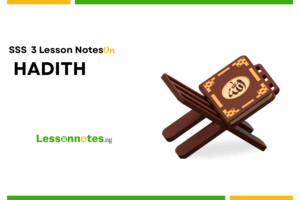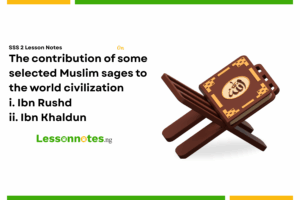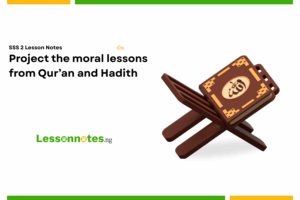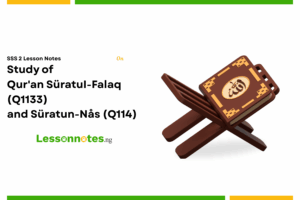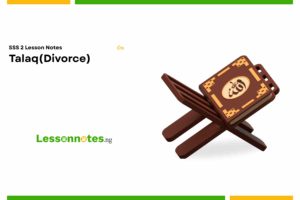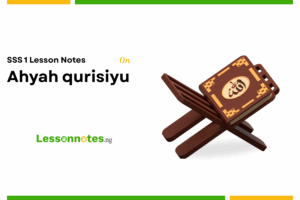Hadith 34th and 35th, 38th and 41st of An-Nawawi’s Collection SS2 Islamic Studies Lesson Note
Download Lesson NoteTopic: Hadith 34th and 35th, 38th and 41st of An-Nawawi’s Collection
Hadith are the recorded sayings, actions, and approvals of Prophet Muhammad (peace be upon him). They are the second most important source of Islamic teachings after the Holy Quran. The word “Hadith” means “narrative” or “report” in Arabic.
Imam An-Nawawi collected 42 important Hadiths that cover the core teachings of Islam. Today, we will study four of these Hadiths: the 34th, 35th, 38th, and 41st. These Hadiths teach us about stopping wrongdoing, brotherhood in Islam, good deeds, and following the Prophet’s guidance.
The 34th Hadith: Stopping Wrongdoing
The Text of the 34th Hadith
Abu Sa’eed Al-Khudri (may Allah be pleased with him) reported that the Prophet Muhammad (peace be upon him) said:
“Whoever among you sees a wrong, let him change it with his hand; if he is unable to do so, then with his tongue; and if he is unable to do so, then with his heart—and that is the weakest of faith.”
(Reported by Muslim)
Understanding the 34th Hadith
This Hadith teaches us about our duty to stop wrong things from happening around us. The Prophet gave us three ways to stop wrongdoing:
- With our hands: This means taking direct action to stop something wrong. For example, if you see someone dropping trash, you can pick it up. If you see a child about to touch something hot, you can move their hand away.
- With our tongues: If we cannot act directly, we should speak up. For example, if we see someone being unkind, we can ask them to stop. We can also teach others about right and wrong.
- With our hearts: If we cannot act or speak up, we should at least feel in our hearts that something is wrong. We should dislike the wrong action. This is described as the “weakest of faith” because it does not help change the situation.
Lessons from the 34th Hadith:
– We have a duty to stand up against wrong things
– We should use the most effective method available to us
– Doing nothing when we see wrong is not acceptable
– Our actions show the strength of our faith
– We must be brave in stopping wrongdoing
– Each person can make a difference in their community
The 35th Hadith: Brotherhood in Islam
The Text of the 35th Hadith
Abu Hurairah (may Allah be pleased with him) reported that the Prophet Muhammad (peace be upon him) said:
“Do not hate one another, do not envy one another, do not turn away from one another, do not cut off relations with one another. Be, O servants of Allah, brothers. A Muslim is the brother of a Muslim. He does not wrong him, nor does he forsake him, nor does he look down upon him. Piety is here (pointing to his chest three times). It is evil enough for a Muslim to look down upon his brother Muslim. All of a Muslim is sacred to another Muslim: his blood, his property, and his honor.”
(Reported by Muslim)
Understanding the 35th Hadith
This Hadith teaches us how Muslims should treat each other. The Prophet gives clear instructions about building a strong community:
- Do not hate one another: We should keep our hearts free from hatred.
- Do not envy one another: We should be happy for the blessings others receive.
- Do not turn away from one another: We should not ignore each other or refuse to talk.
- Do not cut off relations: We should maintain family ties and friendships.
- Be brothers: All Muslims are like one family and should treat each other with love.
- Do not wrong your brother: We should not harm other Muslims in any way.
- Do not forsake him: We should help other Muslims when they need us.
- Do not look down upon him: We should respect all Muslims regardless of their wealth or status.
- Piety is in the heart: True goodness comes from what is in our hearts, not just our outward actions.
- All of a Muslim is sacred: We must respect other Muslims’ lives, property, and dignity.
Lessons from the 35th Hadith:
– Brotherhood is a core value in Islam
– Our relationships should be based on respect and kindness
– We have a duty to help and support fellow Muslims
– True faith is measured by how we treat others
– A healthy community requires good relationships between its members
– Respect for others’ rights is essential in Islam
The 38th Hadith: Hostility Toward the Friends of Allah
The Text of the 38th Hadith
Abu Hurairah (may Allah be pleased with him) reported that the Prophet Muhammad (peace be upon him) said:
“Allah the Almighty has said: ‘Whoever shows hostility to a friend of Mine, I declare war upon him. My servant does not draw near to Me with anything more beloved to Me than the religious duties I have enjoined upon him, and My servant continues to draw near to Me with supererogatory works so that I shall love him. When I love him, I am his hearing with which he hears, his sight with which he sees, his hand with which he strikes, and his foot with which he walks. Were he to ask of Me, I would surely give it to him, and were he to ask Me for refuge, I would surely grant it to him.'”
(Reported by Bukhari)
Understanding the 38th Hadith
This Hadith is called a Hadith Qudsi, which means it contains words of Allah as narrated by the Prophet. It teaches us about:
- Friends of Allah: These are people who are very close to Allah because of their good deeds and pure hearts.
- Warning against hostility: Allah warns us not to harm or disrespect those who are close to Him.
- Religious duties: The most important way to become close to Allah is by doing what He has made required for us (like the five daily prayers).
- Extra good deeds: After doing what is required, we can get even closer to Allah by doing extra good deeds (like optional prayers).
- Allah’s love: When someone becomes very beloved to Allah, Allah helps them in everything they do.
- Allah’s support: Allah answers the prayers of those who are close to Him and protects them.
Lessons from the 38th Hadith:
– We should respect those who are close to Allah
– Required acts of worship are more important than optional ones
– We can become closer to Allah through extra good deeds
– Allah helps and guides those who are devoted to Him
– Allah’s love is the greatest blessing a person can receive
– True success comes from being close to Allah
The 41st Hadith: Following the Prophet’s Way
The Text of the 41st Hadith
Abu Muhammad Abdullah bin Amr bin Al-As (may Allah be pleased with them) reported that the Prophet Muhammad (peace be upon him) said:
“None of you truly believes until his desires follow what I have brought.”
(A fine and genuine Hadith which was related by Al-Hafiz Abu Bakr Al-Bazzar)
Understanding the 41st Hadith
This short but powerful Hadith teaches us about the importance of following the Prophet’s guidance in our lives:
- True belief: Complete faith means more than just saying we believe. It means actually following the Prophet’s teachings.
- Controlling desires: We all have wants and wishes, but a true believer makes sure these desires match what Islam teaches.
- The Prophet’s guidance: The Prophet Muhammad (peace be upon him) brought us Allah’s message about how to live our lives.
- Putting faith first: When our personal desires conflict with Islamic teachings, we should choose to follow Islam.
Lessons from the 41st Hadith:
– Faith must be shown through actions, not just words
– Our personal desires should not come before Islamic teachings
– Following the Prophet’s way leads to a good and balanced life
– Islam guides our choices and preferences
– True happiness comes from controlling our desires according to Islam
– Faith grows stronger when we align our wishes with Islamic values
Connecting These Four Hadiths
These four Hadiths work together to teach us important lessons:
- The 34th Hadith teaches us to take action against wrong things.
- The 35th Hadith shows us how to build a strong community through brotherhood.
- The 38th Hadith explains how to become close to Allah through worship and good deeds.
- The 41st Hadith reminds us to follow the Prophet’s guidance in all aspects of life.
Together, they guide us on how to be good Muslims in our personal lives, in our communities, and in our relationship with Allah.
How to Apply These Hadiths in Daily Life
- Stand up for what is right: When you see something wrong, take appropriate action to change it.
- Build strong relationships: Treat other Muslims with respect and kindness. Avoid fighting, jealousy, and disrespect.
- Perform your religious duties: Make sure to complete all required acts of worship like prayer and fasting.
- Do extra good deeds: After completing what is required, do extra acts of worship and kindness.
- Control your desires: When you want to do something, first check if it follows Islamic teachings.
- Respect those who are close to Allah: Be respectful to religious people who are devoted to worship.
- Check your heart: Remember that what is in your heart matters as much as your actions.
Conclusion
These four Hadiths from An-Nawawi’s collection provide important guidance for living as a Muslim. They teach us to stand against wrong, build brotherly relationships, strive to be close to Allah, and follow the Prophet’s way in all aspects of life. By understanding and applying these teachings, we can improve ourselves, strengthen our community, and earn Allah’s pleasure.







